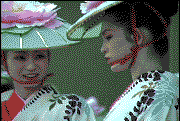Have you already seen any Japanese moive like “Shall We Dance?” I wrote earlier. You know Japanese. I mean how difficult it seems to be for for foreigners. But when you need to talk to Japanese, it is better to say something in Japanese.
Even in Japan, you can start with “HELLO”, or “EXCUSE ME.” They understand the meaning of the words, but it is a little bit hard for them to catch those words with native pronunciation. In the most cases, they react like “What should I do? This foreinger looks like talking to me. I hope he/she will just leave now” Then, they will say, “I’m sorry” or nothing and leave before you get into a subject.
The problem here is that your native pronunciation makes them nervous. Most Japanese people aren’t accustomed to face foreigners in the real world. Even they watch a lot of American movies, bu they change their attitude when they are in situation with real Americans.
So, what should YOU do? Use any Japanese for getting a confortable start with them. But don’t pick wrong words like “Samurai”, “Geisha”, “Fujiyama” or they immediately recognize you as a stupid alian. There is a word having useful plural meanings. It is “Doh-mo.” This word means “Hello (Hi)” “Thank you” “Sorry” and “Good bye.” It expresses a sort of emotion; appreciation, appology, sympathy, and blessing. For the presie of the use you should put something before or after DOH-MO. However it is too much for you anyway at the begining. Just try to use them when you want to talk to Japanese. They will show their smile to you.
Welcome to "Clues on Japan"
Thank you for visiting the site. If you come from my old site, welcome back. I restarted the blog site, because the old one limited the subject from the title, "Travel to Japan." Some people can't go there or don't want to go there physically but want to know about Japan. So, I opened the plate wider for anyone who get any interest in Japan on any level. For the start of the new site, I want to put the old postings for new visitors. So, if you already went though them, please be patient for new posting.
Subscribe to:
Post Comments (Atom)

No comments:
Post a Comment